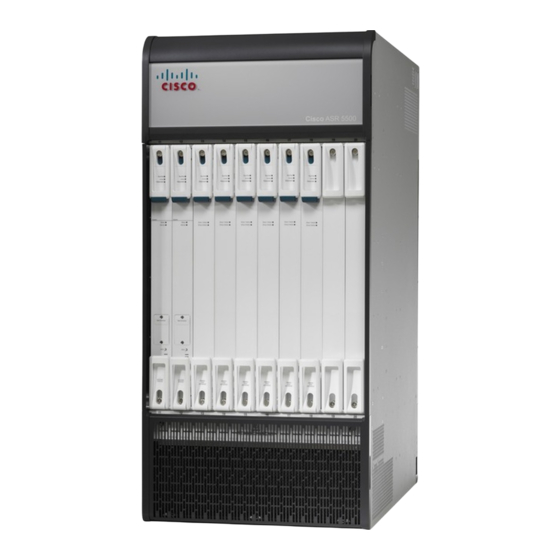Cisco ASR 5500 Manual de instalação
Procurar online ou descarregar pdf Manual de instalação para Hardware de rede Cisco ASR 5500. Cisco ASR 5500 31 páginas.
Também para Cisco ASR 5500: Visão geral do procedimento de instalação (6 páginas)

Troubleshooting
This chapter provides information and instructions for using the system command line interface (CLI) for
troubleshooting any issues that may arise during system operation.
Refer to the ASR 5500 Installation Guide for comprehensive descriptions of the hardware components addressed
by these troubleshooting procedures.
•
•
•
•
•
•
Detecting Faulty Hardware
When power is applied to the chassis, power is sequentially applied to the Management I/O (MIO/UMIO/MIO2)
cards, Data Processing Cards (DPC/UDPC/DPC2/UDPC2s), Fabric and Storage Cards (FSCs), and System
Status Cards (SSCs).
Each PFU and card installed in the system incorporates light emitting diodes (LEDs) that indicate its operating
status. This section describes how to use these status LEDs to verify that all of the installed components are
functioning properly.
Important
As the system progresses through its boot process, some cards will not exhibit immediate LED activity. Allow
several minutes to elapse after a reboot is initiates before checking the LEDs on the various cards to verify
that the boot process has successfully completed.
Licensing Issues
The system boot process is governed by StarOS licenses. During the startup process, each card performs a
series of Power-On Self Tests (POSTs) to ensure that the hardware is operational. These tests also verify that
the card meets all license requirements to operate in this chassis.
Refer to Chassis Universal License Requirements in the ASR 5500 Installation Guide for additional information
on the effect licenses and card types have on the boot process.
Detecting Faulty Hardware, on page 1
Taking Corrective Action, on page 20
Verifying Network Connectivity, on page 23
Using the System Diagnostic Utilities, on page 26
Generating an SSD, on page 29
Configuring and Using the Support Data Collector, on page 29
Troubleshooting
1
